General Physics
How light can vaporize water without the need for heat
It's the most fundamental of processes—the evaporation of water from the surfaces of oceans and lakes, the burning off of fog in the morning sun, and the drying of briny ponds that leaves solid salt behind. Evaporation ...
52 minutes ago
0
1
Biochemistry
Researchers develop eggshell 'bioplastic' pellet as sustainable alternative to plastic
What if there was plastic-like material that could absorb excess nutrients from water and be used as a fertilizer when it decomposes? That product—a "bioplastic" material—has been created by University of Saskatchewan ...
1 hour ago
0
47

Previous theory on how electrons move within protein nanocrystals might not apply in every case
Researchers believe that understanding how electrons move within small, natural systems could power a more sustainable future for our energy grid.
Researchers believe that understanding how electrons move within small, natural systems could power a more sustainable future for our energy grid.
Analytical Chemistry
2 hours ago
0
50

Fruit fly pest meets its evolutionary match in parasitic wasp
A parasitic wasp that preys on the young of a prolific fruit fly pest demonstrates both molecular evolution and behavioral adaptations in the face of ecological pressures, according ...
A parasitic wasp that preys on the young of a prolific fruit fly pest demonstrates both molecular evolution and behavioral adaptations in the face of ...
Plants & Animals
2 hours ago
0
33

World's chocolate supply threatened by devastating virus
A rapidly spreading virus threatens the health of the cacao tree and the dried seeds from which chocolate is made, jeopardizing the global supply of the world's most popular treat.
A rapidly spreading virus threatens the health of the cacao tree and the dried seeds from which chocolate is made, jeopardizing the global supply of the ...
Molecular & Computational biology
2 hours ago
0
5
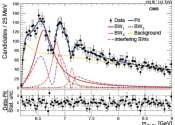
CMS Collaboration observes new all-heavy quark structures
For over a decade, the CMS Collaboration, a large team of researchers based at different institutes worldwide, has been analyzing data collected at the Compact Muon Solenoid, a general-purpose particle detector at CERN's ...
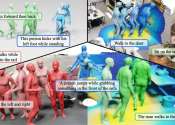
A new framework to generate human motions from language prompts
Machine learning-based models that can autonomously generate various types of content have become increasingly advanced over the past few years. These frameworks have opened new possibilities for filmmaking and for compiling ...
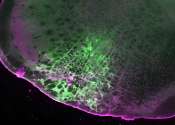
Chemical tool illuminates pathways used by dopamine, opioids and other neuronal signals
University of Michigan researchers have developed a new tool to better understand how chemicals like dopamine and epinephrine interact with neurons.
Neuroscience
1 hour ago
0
2

Super Mario hackers' tricks could protect software from bugs, study finds
Video gamers who exploit glitches in games can help experts better understand buggy software, students at the University of Bristol suggest.
Software
39 minutes ago
0
0
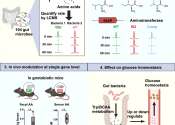
Gut microbiota acts like an auxiliary liver, study finds
Microbes in the mammalian gut can significantly change their hosts' amino acid and glucose metabolism, acting almost like an extra liver, according to a new preclinical study by Weill Cornell Medicine investigators.
Gastroenterology
2 hours ago
0
31
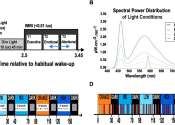
Higher light levels may improve cognitive performance
Exposure to higher levels of light can help people feel more awake and increase cognitive performance, probably by influencing the activity of parts of a brain region called the hypothalamus, according to new research.
Neuroscience
2 hours ago
0
40
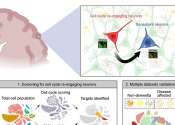
Brain neurons re-entering the cell cycle age quickly and shift to senescence, particularly in neurodegenerative disease
Post-mitotic neurons in the brain that re-enter the cell cycle quickly succumb to senescence, and this re-entry is more common in Alzheimer's disease, according to a new study published April 9 in the open-access journal ...
Neuroscience
2 hours ago
0
16

The world's largest 3D printer is at a university in Maine. It just unveiled an even bigger one
The world's largest 3D printer has created a house that can cut construction time and labor. An even larger printer unveiled on Tuesday may one day create entire neighborhoods.
Engineering
2 hours ago
0
20

The Future is Interdisciplinary
Find out how ACS can accelerate your research to keep up with the discoveries that are pushing us into science’s next frontier
 Medical Xpress
Medical Xpress

Researchers identify gap in European bronchiectasis treatment

Dengue fever infections found to have negative impacts on infant health for three years

PET scans uncover smoldering inflammation in MS patients

Using AI to detect dry eye disease

Gut microbiota acts like an auxiliary liver, study finds

Innovative microscopy demystifies metabolism of Alzheimer's

Study suggests that living near green spaces reduces the risk of depression and anxiety

Liver cancer: Molecular signaling pathway of tumor development decoded

Social media affects people's views on mental illness, study finds

Charting brain synchronization patterns during social interactions
 Tech Xplore
Tech Xplore

New mitigation framework reduces bias in classification outcomes

New model elevates UAV efficiency in next-gen wireless networks

Researchers achieve sustainable recovery of minerals from e-waste

A new framework to generate human motions from language prompts

Personalization has the potential to democratize who decides how LLMs behave

Holographic displays offer a glimpse into an immersive future

Energy-smart bricks keep waste out of landfill

The use of AI in war games could change military strategy

Understanding the spread of behavior: How long-tie connections accelerate the speed of social contagion
Human beings are likely to adopt the thoughts, beliefs, and behaviors of those around them. Simple decisions like what local store is best to shop at to more complex ones like vaccinating a child are influenced by these behavior ...
Social Sciences
3 hours ago
0
1

Gone in a puff of smoke: 52,000 square kilometers of 'long unburnt' Australian habitat has vanished in 40 years
Landscapes that have escaped fire for decades or centuries tend to harbor vital structures for wildlife, such as tree hollows and large logs. But these "long unburnt" habitats can be eliminated by a single blaze.
Plants & Animals
3 hours ago
0
12

Researchers detect a new molecule in space
New research from the group of MIT Professor Brett McGuire has revealed the presence of a previously unknown molecule in space. The team's open-access paper, "Rotational Spectrum and First Interstellar Detection of 2-Methoxyethanol ...
Astronomy
7 hours ago
0
89

Study reveals insights into DDX41 protein's role in blood cancer pathogenesis
A study led by Professors Hongtae Kim and JaYil Lee from the Department of Biological Sciences, in collaboration with researchers from the Catholic University of Korea, sheds light on the pivotal role of mutated DDX41 protein ...
Oncology & Cancer
3 hours ago
0
32

Spintronics research shows material's magnetic properties can predict how a spin current changes with temperature
Spintronics is a field garnering immense attention for its range of potential advantages for conventional electronics. These include reducing power consumption, high-speed operation, non-volatility, and the potential for ...
Condensed Matter
3 hours ago
0
64

Manipulating the geometry of the 'electron universe' in magnets
Researchers at Tohoku University and the Japan Atomic Energy Agency have developed fundamental experiments and theories to manipulate the geometry of the "electron universe," which describes the structure of electronic quantum ...
Condensed Matter
8 hours ago
0
35

Supercomputer simulation reveals new mechanism for membrane fusion
An intricate simulation performed by UT Southwestern Medical Center researchers using one of the world's most powerful supercomputers sheds new light on how proteins called SNAREs cause biological membranes to fuse.
Molecular & Computational biology
8 hours ago
0
31

Astrophysicists work toward unification of turbulence framework—weak-to-strong transition discovered in turbulence
Turbulence is ubiquitous in nature. It exists everywhere, from our daily lives to the distant universe, while being labeled as "the last great unsolved problem of classical physics" by Richard Feynman. Prof. Dr. Huirong Yan ...
Astronomy
3 hours ago
0
7

Innovative microscopy demystifies metabolism of Alzheimer's
Alzheimer's disease causes significant problems with memory, thinking and behavior and is the most common form of dementia, affecting more than 50 million people around the world each year. This number is expected to triple ...
Alzheimer's disease & dementia
3 hours ago
0
16

Researchers create artificial cells that act like living cells
In a new study published in Nature Chemistry, UNC-Chapel Hill researcher Ronit Freeman and her colleagues describe the steps they took to manipulate DNA and proteins—essential building blocks of life—to create cells that ...
Biochemistry
3 hours ago
0
32

Investigating the efficacy of methods to stimulate adventitious rooting of Lindera benzoin stem cuttings
The variability among woody plants in their responses to asexual propagation techniques poses challenges and severe limits for commercial production. While some species readily root from stem cuttings, others are more difficult ...

Emotion can cause chickens to get red in the face
Studying emotion in animals is a complex research field, little explored up to now in birds, although reddening of the skin had already been observed in previous work on the blue-and-yellow macaw. An INRAE research team focused ...

Warming climate is putting more metals into Colorado's mountain streams
Warming temperatures are causing a steady rise in copper, zinc, and sulfate in the waters of Colorado mountain streams affected by acid rock drainage. Concentrations of these metals have roughly doubled in these alpine streams ...

Environmental lawyer calls for a gender-sensitive international legal framework to protect climate migrants
Because 80% of climate migrants are women and girls, a new international legal framework is needed to protect human rights, incorporating gender-sensitive and responsive measures in policies and legislation.

How companies can use generative AI for empathetic customer relationships to create lifetime value
Researchers from National Taiwan University and the University of Maryland have published a new Journal of Marketing article that examines how marketers can use GenAI to provide empathetic customer care.

Early analysis finds eclipse had noticeable effect on birds
Early results from a study of the April 8 total solar eclipse show a more noticeable effect on bird behavior than during the last eclipse.

Unconventional technology enhances composites important to automotive, aerospace and renewable energy industries
Scientists at the Department of Energy's Oak Ridge National Laboratory have developed a method that demonstrates how fiber-reinforced polymer composite materials used in the automotive, aerospace and renewable energy industries ...

Hubble celebrates 34th anniversary with a look at the little dumbbell nebula
In celebration of the 34th anniversary of the launch of NASA's legendary Hubble Space Telescope on April 24, astronomers took a snapshot of the Little Dumbbell Nebula (also known as Messier 76, M76, or NGC 650/651) located ...

Research reveals tools to make STEM degrees more affordable
In a new study in Issues in Science and Technology, Dominique J. Baker, an associate professor in the College of Education and Human Development and the Joseph R. Biden, Jr. School of Public Policy & Administration at the ...

Missing identity options on forms can prompt anger, reduce belonging
Being asked to provide demographic information in official forms such as job applications—but finding one's own identity group missing from demographic options provided—can signal a low likelihood of belonging in a given ...

Talks on global plastic treaty begin in Canada
Negotiators from 175 nations began talks Tuesday to agree a global treaty to reduce plastic pollution, which is found everywhere from mountain tops to ocean depths, and within human blood and breast milk.

Accelerated marine carbon cycling forced by tectonic degassing over the Miocene Climate Optimum
In a recent publication in Science Bulletin, a multidisciplinary team of authors from Tongji University, the Second Institute of Oceanography (Ministry of Natural Resources), the Institute of Earth Environment (Chinese Academy ...

High air pollution in Denmark may impact children's academic performance
Pollution from traffic, farming and wood stoves may have a negative effect on children's cognitive development, according to a new study published in Environment International on Danish students' performance in the lower ...

Firms learn more from 'knowledge-gap' failures than mere 'slip-ups,' says study
A study co-written by a team of University of Illinois Urbana-Champaign business scholars and published in Organization Science finds that organizational learning from failures can vary significantly based on two factors: ...

A non-equivalent co-doped strategy to improve the electrical properties of piezoelectric ceramics
In the field of aerospace, a high-temperature piezoelectric vibration sensor is one of the few key devices that can be monitored in a high-temperature and harsh environment, so it is particularly urgent to develop high performance ...

Tailoring electron vortex beams with customizable intensity patterns by electron diffraction holography
A new research study from Opto-Electronic Advances discusses tailoring electron vortex beams with customizable intensity patterns by electron diffraction holography.

Livestock abortion surveillance could protect livelihoods and detect emerging global pathogens
A small-scale surveillance system in Tanzania for reporting livestock abortions could help protect livelihoods and provide insights on potential livestock-to-human infections.

New database sheds light on violence in Greek detention facilities
The University of Oxford's Border Criminologies research network have contributed to the first interactive, open-source database of rights violations inside Greek detention centers.

Exploring a molecular mechanism that facilitates thermophilic fungal adaptation to temperature change
Thermophilic fungi are chief components of mycoflora in a variety of natural and manmade composting systems, including rotting hay, stored grains, wood mulch, nesting material of birds and animals, municipal refuse, and self-heating ...

Planting trees in grasslands won't save the planet—instead, protect and restore forests
Tree planting is one of the nature-based solutions being used to offset greenhouse gas emissions. Trees absorb atmospheric carbon dioxide. Many of these tree planting projects target Africa's rangelands (open grasslands or ...









































